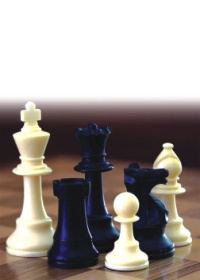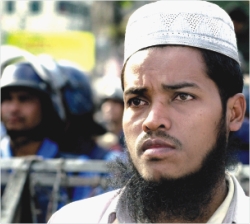
Inside
|
Time to play the long game Forget about the 2007 election, writes Farid Bakht, it is the 2012 one that we need to focus on and that will shape the future of the country All eyes are on the elections due for January 2007. Will they happen, what are the rules, who will stand and who will not? What will the Americans do? What about the Europeans? Most of all, what's going on inside the heads of a couple of major-generals? Do they want to give up the cushy UN-sponsored high life of foreign tours and foreign exchange and get their hands dirty in the murky world of Bangladeshi politics? Now that Bangkok has led the way, with tacit support by the West, do the US-trained generals in Dhaka feel that their time has come? A subset of that speculation since 2004 has been the possible formation of a so-called "National Unity Government," using models derived from the experiences of Hamid Karzai and Jalal Talebani in Kabul and Baghdad, respectively. Namely, puppet governments, consisting of venerable, incorruptible gentlemen and ladies, spouting democracy and governance, propped up by the steel of the army. And the World Bank. Politics revolves around the chances of dubious individuals getting their hands on the booty, by buying their way into ministerial positions. Voices in the wilderness instead implore us to focus on two areas if we want to be around in 2021 to celebrate 50 years of liberation. Firstly, insufficient emphasis is given to the true objectives of the players in the not-so-great game of ruling Bangladesh, and to its relationship with India and Pakistan. Secondly, hardly any time is devoted to finding the road map to ensure that the state actually survives beyond the middle of the second decade. If this is not crisis, what is?
The "foreign hand" They want: (a) policy coherence; (b) a commitment to stick to contracts come what may; and (c) the strength to hold it together in the face of popular protests. Western multinationals looked with disbelief at the unceremonious dumping of the British company, Asia Energy. What are they going to say if the Chinese or Koreans are given the concessions instead? The Oil Majors have been throwing up their hands and departing one by one as weak governments have dithered over allowing the export of gas. Indian giant, Tata, trying to get its hands on cheap gas and coal for a steel plant, must have lost some of its smugness as it realizes that these are treacherous waters to do business in. No one, it seems, can deliver. Democratic leaderships are weak, out of touch with the people, and discredited both at home and abroad. Whenever a policy or proposal is opposed on the street and the protestors survive the first lathi-charge or shooting, subsequent blockades and arson force the government of the day to cave in. Rarely does a policy favoured by foreign companies and the World Bank actually get implemented. Some individuals will have come to the conclusion that coal and gas cannot be exported under democratic regimes. There is undoubtedly behind the scenes pressure from some of these companies and some embassy political officers to force the military to "intervene." This is a polite way of saying that they should trample over the people's constitutional rights, exile the leaderships of both the main parties, and arrest their armed thugs or shoot them "while they are trying to escape." Left-wing guerrillas can bear witness to the rough justice being meted out by the death squads of the Rapid Action Battalion (Rab). Hundreds of poor leftist fighters have been executed by Ray-Ban wearing firing squads in remote areas in the north and south. Now Rab may be called in to keep the volatile urban milieu under check.. The bottom line is that there is a lot of money to be made in Bangladesh. Resources such as coal and gas are waiting to be exploited at rock-bottom prices and exported to fuel-hungry India. The rapid urbanization of the country and the growth of a nascent middle class (at least to date) is a prize many companies would like to grab, fulfilling their need for electricity, water, telephone, education, and health. The mobile telecom companies have proved that behind the overall low per capita income numbers lie untapped riches. After all, 10% of 150 million is equivalent to a market the size of a small European country. While ministers waste their breath on "improving the national image" and other such diversions, these companies are waiting for some no-nonsense leaders with raw power to take control and lay down the red carpet. The BNP and Awami League laid out their tatty version of that carpet but have since reneged on most of their commitments with one hand, while using the other to steal and rob. If it carries on like this, one cannot imagine that many multi-nationals are going to be hanging around for more than a few more years waiting for their licences. There are opportunities in West Bengal, Western China, Tibet, and eventually, Myanmar. In pursuit of their version of Asia Inc, the elite classes are therefore ready to jettison pretensions to democratic process and welcome the two-headed monster of a civil society-military government. After a honeymoon period, even they will start to realize that Bangladesh is an ungovernable state. In its Development and prosperity are definitely possible, but only with a radically different type of political leadership. This is a pipe dream for now, but as Nepal shows, political forces can appear, as if from nowhere, and bring a state to its knees. A low-intensity campaign against left-wing guerrillas has been going on for some time now. Moribund for so long, there are signs that it is not impossible for them to learn from the rapid escalation of similar groups over large swathes of India. Written off, they may well become a factor to be reckoned with in five years. Before they get going, another, darker force of Talibanesque fighters will be cobbled together to challenge pro-Western politicians and generals. We got a taste of that in the artificial but effective bombing campaign of 2004 and 2005. They are bound to re-appear again, especially if the Jamaat is out of government. It will not take much to turn Dhaka into a city under permanent siege. People forget just how bad "normal" law and order was in 2002. Even the diplomatic enclaves were subjected to routine violence and robberies. Disaffected groups can capitalize on the massive levels of youth unemployment and roaring inflation in the price of basic goods such as rice. Expect an Islamist challenge, followed by a left-wing equivalent, first in the small towns and then in the big cities of Dhaka and Chittagong. The military will be busy, just as their cousins are in Pakistan. Meanwhile, the state continues to be drained of vigour and meaning. It is realistic to say that Bangladesh is a prime candidate for state failure. It is being destroyed from within. Even now, more than a generation on, we cannot resolve the issues of Bengali nationalism and the place of religion in politics. Violence has been democratized. It is relatively inexpensive to kit a few thousand fighters with AK-47s and improvised explosive devices. Instability is coming and the army cannot crush that new type of opposition. As it is, in the shape of Rab, the army is already on the streets. There will be a significant escalation before the decade is out. So let's get the short term out of the way. The inevitable conflict will make its appearance during the tenure of the next regime, whether it is democratic in name or a naked military autocracy. Once we have understood the implications of that situation, we will have a realistic discourse about the future of the country. The present pre-occupation with the electoral system is laudable and vital for democracy. The only problem is that some of the worst off people in the world are being offered no real choice. Five years of Awami League rule will not drive the country forward and transform people's lives. At best, it will be a mildly better version of the BNP, where one imagines that the PM's son, (Joy in this case) would be more polite and less brutal. That is no longer enough. Farid Bakht is the author of Bangladesh: Arrival or Departure (forthcoming). |
 It now looks like the garments industry is going to dramatically shrink by 2010 as hundreds of factories shut down to avoid the coming Chinese onslaught -- postponed in 2005 for only two years. To help that process along, the electricity system is close to collapse and there are no signs of an immediate remedy.
It now looks like the garments industry is going to dramatically shrink by 2010 as hundreds of factories shut down to avoid the coming Chinese onslaught -- postponed in 2005 for only two years. To help that process along, the electricity system is close to collapse and there are no signs of an immediate remedy.  present configuration. With a disastrous relationship with its neighbours. The problems are too vast after decades of post-colonial neglect.
present configuration. With a disastrous relationship with its neighbours. The problems are too vast after decades of post-colonial neglect.